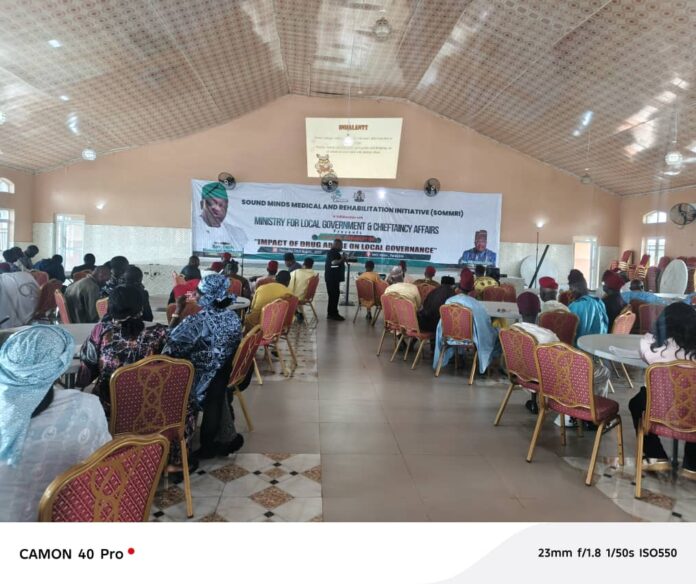A one-day workshop on the Impact of Drug Abuse on Local Governance was held on Thursday, August 28, 2025, at MNS Hotel, Pankshin, bringing together critical stakeholders to deliberate on the growing menace of substance abuse and its far-reaching effects on governance, security, and community development in Plateau State.
The event, organized by the Sound Minds Medical and Rehabilitation Initiative (SOMMRI) in collaboration with the Ministry for Local Government and Chieftaincy Affairs, followed a similar session in the southern zone and is part of a series covering all senatorial zones of the state.
Participants included members of the Plateau Youth Council (PYC), security agencies, local government chairmen, directors of primary health care and social services, traditional rulers, religious leaders, and community representatives. Proceedings began with the administration of questionnaires to generate data that will inform state policies on prevention and rehabilitation.

Experts Warn of Health and Social Consequences
Prof. Nwoga Charles of the University of Jos highlighted the medical dangers, noting that while substances like cannabis, tramadol, and codeine may give a temporary high, they leave lasting damage to the brain, lungs, heart, and immune system.
“Substance abuse destabilizes mental health, drains motivation, and disrupts relationships, trapping young people in cycles of addiction and societal decline,” he said.

Clinical Psychologist Mafai Dauboyi stressed the need to address root causes.
“People use drugs for a reason, but the consequences are devastating. Poor family management, academic stress, and lack of monitoring create openings. However, positive relationships, coping skills, and a sense of purpose can shield our youth,” he explained.

Facilitator Ndak Zuhumnan Andarawus (Nurse Kizito) called for collective action.
“The stakeholders here are enough to end drug syndicates if we unite. Parents must know their children’s friends, schools should maintain drug testing, and communities must block supply chains. With psychoeducation and government support, the future can be secured,” he urged.


Traditional Rulers Decry Weak Structures
Traditional rulers voiced frustration over weak enforcement and lack of empowerment.
- The Pankyan District Head lamented that drug distributors are often released due to interference:“Some even operate with official registrations. Until traditional rulers are empowered, our ability to fight this menace remains limited.”
- Bala Makkah, District Head of Chip, added:“No parent desires a child destroyed, yet social media worsens exposure. We are ready to partner with government once a strong law is passed. It is a shame Plateau still lacks rehabilitation centres.”
- Kupshak Goma, District Head of Amper, stressed synergy:“Without collaboration between traditional councils and security agencies, our efforts will remain fragmented.”
- Idris Shehu, District Head of Kanam, called for youth engagement:“Idleness fuels drug use. Reviving debates, quizzes, and cultural events will channel youthful energy into positive growth.”

Youths Demand Grassroots Action
Young leaders insisted that the drug trade is becoming normalized.
- Ahmed Abdullahi Kantana, Deputy KYC Chair (Kanam), said:“In the past, drugs were hidden, but now they are sold openly, even in cattle markets. Plateau ranks among the highest states in drug use—this must stop.”

- Mrs. Firapmun Zacharia of the NCWS, Bokkos, noted the burden on families:“Women bear the heaviest brunt. Some harmful substances even carry NAFDAC approval, confusing families. This campaign must reach every local government.”
- Tromhan Yusuf Iliya from Gindiri advocated for accessibility:“Rehabilitation should be affordable and available in every local government, alongside stronger school-based prevention.”


Religious Leaders Call for Moral Revival
Faith leaders urged the integration of spiritual guidance in policy responses.
- Alh. Hudu Ibrahim, JNI Chairman, Mangu, stated:“Our holy books condemn addiction, yet leaders are sidelined. If laws combine with spiritual guidance, we will achieve better results. We must return to God.”
- Catechist Yeyek Amos, CAN Assistant Secretary, Pankshin, warned:“Neglecting children today means arming tomorrow’s criminals. Many schools lack qualified religious instructors, leaving them vulnerable. If the government delays, the consequences in ten years will be dire.”
Security and Other Stakeholders Stress Law Enforcement
Security operatives linked drug abuse to rising crime.
“Many youths under the influence commit acts with no restraint. This workshop is timely as it empowers parents and communities while complementing government measures like compulsory drug testing in schools,” a representative said.

Other participants called for clear roles for security and traditional councils, stronger NDLEA presence across LGAs, continuity in government policies, and strict enforcement of by-laws. They also warned against collusion between security operatives and drug dealers, stressing that substance abuse goes beyond illicit drugs to include misuse of prescription medicines.



Path Forward
The workshop ended with a consensus that tackling drug abuse requires a multi-sectoral approach combining health, security, education, community, and faith-based efforts. Participants urged government to strengthen policies, establish rehabilitation centres, and empower traditional institutions, while communities play their role in prevention and monitoring.

